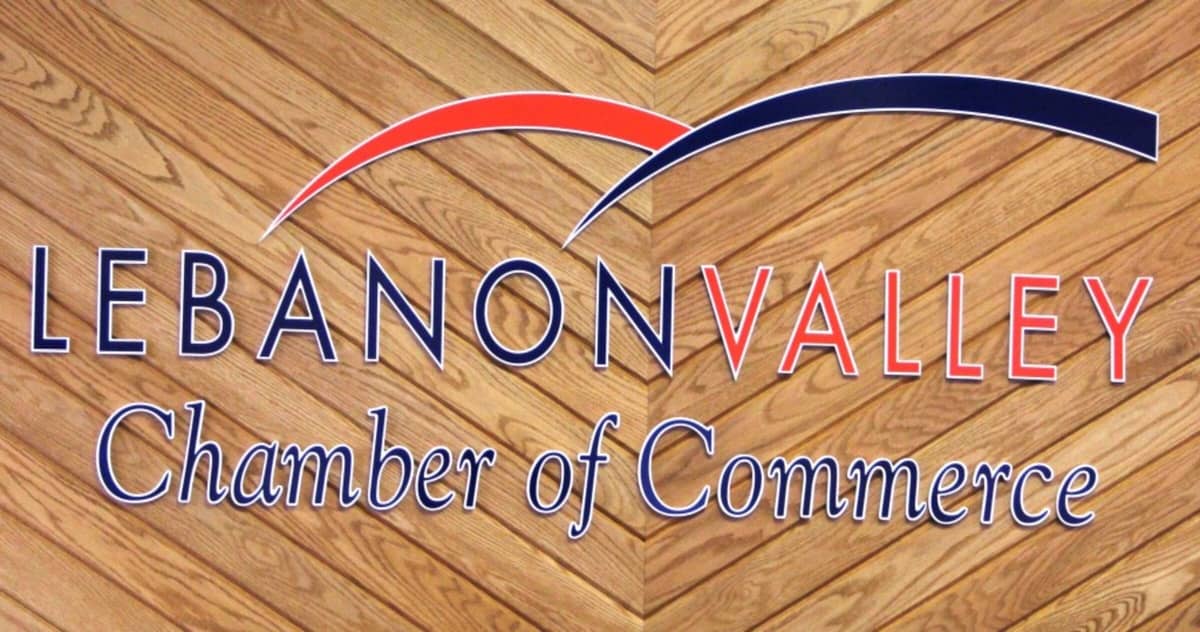The first look at four recommendations for the possible construction of an Advanced Training Center in Lebanon County was revealed last week to County Commissioners during a workshop session.
The year-long, $79,000 Workforce Needs study was conducted by Hanover Research to “meet the current and future occupational training needs for regional employers and our growing population,” according to Karen Groh, executive director of the Lebanon Valley Chamber of Commerce.
Hanover Research received $75,000 and $4,000 went to the chamber for administrative costs associated with the project.
Groh said during the 20-minute presentation that the chamber wished to give a brief overview to commissioners first since they had funded the study and to thank them for making it possible.
“So I know it might seem that we are going to cover the entire study today, but what we really wanted to come in and do was give a quick overview to how we got to this place, to acknowledge the study is complete, to provide you a brief outline of it, and the next steps we’re going to do as we fully release it to the community,” said Groh.
The four study recommendations are:
- Establish an Advanced Training Center in Lebanon County.
- Tailor ATC programs to in-demand skills.
- Maintain consistent communication with the education and business community.
- Next steps: Program development/determine a funding model and location.
“The gist of that (first recommendation) is that we’re going to have a growing population in that age bracket to utilize that training, and they did that through data analysis and that the current facilities that we have are not necessarily able to fulfill those needs – of what the future needs are,” said Groh.
Groh said one project goal was to determine “what’s already here” and if “there’s an ability to expand on what services are already here given the educational facilities that we have.” The center would be for students who have graduated from a vocational and technical school like the county’s Career and Technology Center (CTC) and potentially adults who are between the ages of 18 and 44 looking to “upskill” their skill sets.
“Many of them (the stakeholders) are listed here,” said Groh. “There have been conversations with HACC and the CTC and other facilities, so we need them to have time to look at it and have meetings with us.”
LebTown asked Groh after the meeting if the CTC was a frontrunner given it has undeveloped space and the center would be an extension of its existing programming.
“The original proposal was to put it on the site of the CTC, so that was already in there,” said Groh, referring to the original objectives provided to Hanover Research. “They already have, I think, 50 acres and they’re executive committee did approve that conversation to continue exploring it.”
Groh cautioned, however, that other site options are still viable.
“This was just one concept. The idea is, now that you go into feasibility, where does it make sense?” said Groh. “Where is there land? Who is going to take it up administratively, and they may or may not want a site like that, but the CTC would lease the land to whatever entity, if that’s what they choose, whatever entity would be there running the facility.”
Groh told the commissioners that the study was not fully disseminated at the meeting and that the full report was embargoed from the press until all stakeholders had a chance to review it.
The original plan was to release the report on Thursday, Feb. 15, to the press but the chamber issued it on Wednesday afternoon. LebTown will analyze the data and release a more in-depth story at a future date.
At the meeting Groh said the report was to be shared with HACC and CTC officials next, state and federal legislators and regional educators, then the media, and finally community members and stakeholders via a public meeting at LVCC on Feb. 21 at 9:30 a.m.
“This is the first of many conversations for many community partners to determine what makes sense for Lebanon County and, if so, where does something belong, how is it funded, we’re looking for something that’s sustainable and that is self funding in some ways,” said Groh. “Part of the research is to look at the model of other training centers to see how they are remaining open. It is a combination of tuition fees, maybe some state funding, and other things, private partnerships and things like that. We didn’t want to create a two-year school that had to be line itemed every year in a budget.”
Diane Harlow, director of workforce and education for the chamber, discussed how the study was presented to Hanover Research in three phases for the data the chamber wanted to obtain about Lebanon County.
Phase 1 was to determine the current demographic, educational attainment and labor market data in Lebanon County and the surrounding region. A goal was to also obtain information on adult education programs currently available.
“The first way was we really needed to know the current state, the current state of the demographics of our county,” she said. “Not only from what is already reported, but actually taking a deeper dive and looking to see exactly where our training needs are, what we currently offer, where there are opportunities at the current state.”
Harlow said gathering regional data was part of the research request since the county’s youth leave Lebanon County to train elsewhere.
She noted the second phase was “extremely important” to chamber officials.
“We asked the research organization to really interview our employers, we provided them a list of a variety of types of employers,” she said. “They were all aware and they were very gracious to give their time and really provide some great insight. This is not what we think, this is what our employers feel. Know what (workers) they need now but also where they’re going to need them in the next 10 years, which was an important part of the process.”
The third phase asked Hanover to analyze the curricula of Pennsylvania training centers, how they are funded and the programs they provide to their students. She said only state-based training centers were explored given the regulatory environment that exists in the commonwealth.
Harlow believes there are six training centers included in the study and added that Hanover was asked to obtain a variety of information about them.
“We asked (Hanover Research) to not only look at the public-facing information, what type of courses they offer, where their student base is, but we asked them to also find out how they’re funded,” she said. “We wanted to understand where the money is coming in for some of those projects, so that’s what took over a year.”
Hanover Research was asked to interview regional educational institutions, Harlow added.
“They interviewed them very specifically to understand what their current plans are and what their growth plans are for in the community,” she said, “and this was not just data analysis at this point, it was really conversations and really having that time to talk with us. Both the businesses and the education community were thrilled by the conversations. They really enjoyed the opportunity to share their perspectives and to actually feel that they were listened to and valued.”
Groh said the idea for a study was first launched by the chamber in January 2022 with the proposed question of whether Lebanon County needs an advanced training center to enhance workforce development.
“That went out to a number of places to see whether or not this had some feasibility to look into it further,” said Groh. “We vetted it with schools, and the CTC, and our legislators, and it seemed there was interest in pursuing the exploration of whether this could be supported in Lebanon County.”
Groh noted a request for proposal was distributed in August 2022 to “a variety of sources” to ask for their proposal on doing a research study, adding that a valid response was returned by Hanover Research, which had experience in this subject field.
The commissioners were then presented the concept and an outline of what the study would produce for the county.
“You graciously granted us with funds to proceed to that study,” said Groh. “So we proceeded with Hanover Research in January ’23 and completed in January ’24. They completed a full year’s research in a variety of phases. … The data that has come out of it will provide us with good direction in the future.”
During a question-and-answer session with the commissioners, Mike Kuhn asked if other training schools like Thaddeus Stevens in Lancaster County are growing.
“Yes, absolutely,” Groh responded. “I think there is interest in Lebanon County, so there may be partners in Pennsylvania that already have an interest in coming to Lebanon County, so this just gives more basis for generating additional interest for a proven school to potentially utilize this area for setting up another location.”
During the meeting, county administrator Jamie Wolgemuth asked about sustainability.
Hawkins referenced Thaddeus Stevens and others as “really good examples” because their sustainability models receive state funding while also utilizing other funding sources. She added the proposed governor’s 2024 budget, which was presented the day before this meeting, looks to give significant funding increases to vocational trade schools.
The workforce study was financed with county funding and administered by chamber officials in cooperation with Hanover Research of Arlington, Virginia.
“We feel they did a phenomenal job. We held them accountable, they were helpful during the project and grateful at the end. The data that has come out of it will provide us good direction in the future,” said Groh.
Questions about this story? Suggestions for a future LebTown article? Reach our newsroom using this contact form and we’ll do our best to get back to you.

Keep local news strong.
Cancel anytime.
Monthly Subscription
🌟 Annual Subscription
- Still no paywall!
- Fewer ads
- Exclusive events and emails
- All monthly benefits
- Most popular option
- Make a bigger impact
Already a member? Log in here to hide these messages
Our community deserves strong local news. LebTown delivers in-depth coverage that helps you navigate daily life—from school board decisions to public safety to local business openings. Join our supporters with a monthly or annual membership, or make a one-time contribution. Cancel anytime.
























